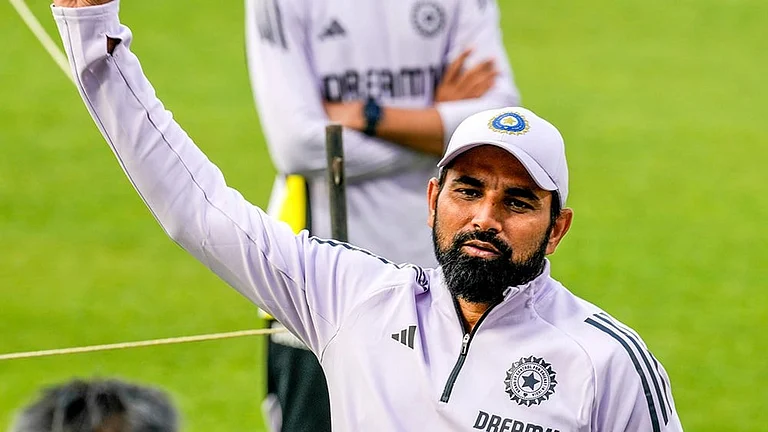What’s more, there seems to be great demand for these outdated ideas. Of late, the kendra’s 61-year-old founder/instructor Aildas Hemnani has become quite the peripatetic guru, travelling all over MP, Maharashtra and Gujarat to conduct training camps. "Now that my former students have been married off into homes all over the country, I often get invited by them to spread my ideas," says Hemnani. He claims to have trained more than 4,000 women in the intricacies of married life since the kendra was founded in 1987. Though the training course at the kendra lasts three months, outstation camps are abridged into 10-day capsules. "My teachings are for 16- to 22-year-olds. All girls should get married after that," he says. Obviously, the working woman has no room in his scheme of things: "Working and managing a home together are not possible. She can work at home, can’t she?"
Classes begin at 7 am everyday with a prayer session. Currently, he has 15 students of "marriageable age" who sit in the centre of the hall, their heads covered, prayer books in hand. Prayers over, the girls look up expectantly at the white-haired Hemnani, who begins the day’s lesson: "It is the duty of a woman to manage the house. To be successful, you have to depend on god and on what you learn here."
Such gems form the core of the course, taught free to the women of Bhopal’s Sindhi community every morning for two hours, six days a week. Bairagarh itself is a residential colony of about 1.5 lakh Sindhis, all of whom follow the teachings of their living guru, Sant Hirdaram. On Saturdays, the numbers can swell to about 40, with ex-pupils—kids in tow—dropping by to refresh their memories.
The training includes rules and principles for everything, from "adjusting" to the demands of "elders and superiors", to appropriate sexual conduct. "The in-laws’ house can be a war zone for the new bride. My effort is to teach young girls how to adapt and become the perfect bahu. Girls must also learn how to please their husbands," explains Hemnani. In the process, these women are equipped with a truly startling mix of myth and subservience.
"He teaches us how to keep our heads covered, where to go and where not to go and how to yield to the desires of our elders," says Nirmala Adchani. The 22-year-old has just completed college and is engaged to be married to a lawyer whom she has met just twice. Her to-be in-laws sent her to the kendra to learn the art of living as a wife and dutiful daughter-in-law. Classmate Jyoti Bharwani adds: "We’ve been taught not to rush into sexual relations with our husbands on the wedding night. Otherwise, they will become lazy and we will have unworthy kids."
What is surprising is that most students come from middle-class families, and are educated. They attend computer classes, drive scooters and have working parents, but blanch at the mention of sex and consider pre-marital interactions with the opposite sex immoral. As 21-year-old Bharti Devnani puts it, "The main thing for us is to get married. What will we do learning about independence?" So, instead, they prefer to learn the Hemnani manoeuvres.
The first month of the course is reserved for religious education, including teachings from the Gita, the Guru Granth Sahib and the Sukhmani Sahib. Students are also taught Gurmukhi, the script for Sindhi language, and naturopathy. In the second month, Hemnani explains the importance of marriage and the woman’s role in it, while the third month is devoted to such delicate matters as personal hygiene, contraception (without the condom or the pill), marital discord and the virtues of celibacy. Hemnani claims he accumulated his knowledge from personal experience and religious scriptures. "Everything I teach either has the backing of science or I have myself experienced it," he says.
Hemnani was inspired to start the training school when the in-laws of his just-married daughter praised him on her upbringing in 1986. As he insists, "In this age of blasphemy and corruption, I am teaching women to be pious." With religious sanction from Sant Hirdaram—who preaches that co-education has a corrupting influence on adolescents—he began touring the community schools scouting for students. A room to conduct classes came in 1994 and a Rs 10-lakh donation from a Mumbai-based businessman enabled him to build the hall, the kendra’s current location. The kendra is named after the businessman’s daughter. "My monthly expenses are about Rs 35-40,000 for books and food and the community raises enough to keep the kendra flourishing," says Hemnani. Though it’s an autonomous body, the Manju Sanskar Kendra is affiliated to the Jeev Sewa Sansthan (JSS), a Sindhi NGO. The JSS has hosted such dignitaries like deputy PM L.K. Advani, RSS supremo K. Sudarshan and others.
When asked why men aren’t invited to be students, Hemnani dismisses the query. "Men will be men. They don’t think it’s their responsibility." The poor, poor women.


























